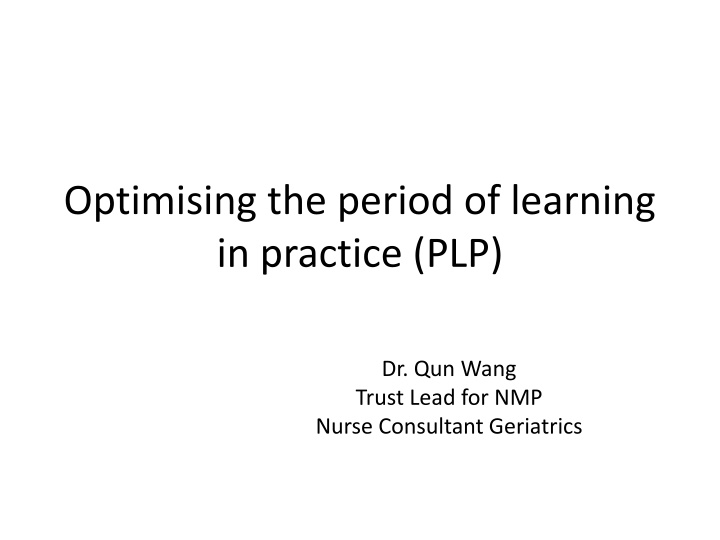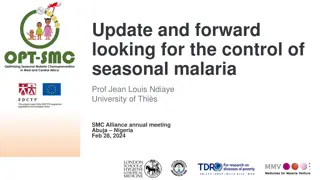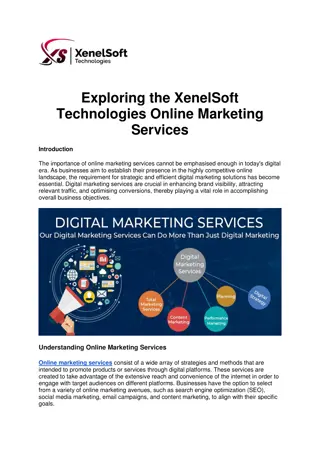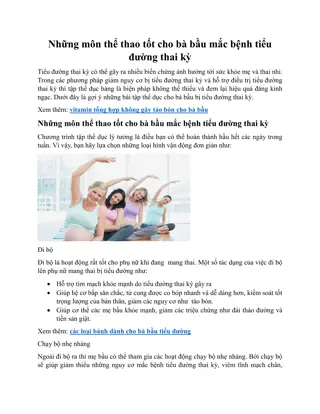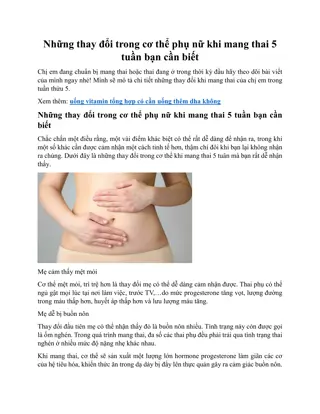Optimising the Period of Learning in Practice for Future NMPs
Optimising the Period of Learning in Practice (PLP) is crucial for ensuring the quality and safety of future Non-Medical Prescribers (NMPs). Dr. Qun Wang, Trust Lead for NMP Nurse Consultant Geriatrics, emphasizes the importance of a competency framework that allows trainees to transition theory into practice. Key stakeholders, including DPPs, Named Practice Supervisors, and Practice Assessors, play a critical role in guiding NMP trainees through over 90 hours of prescribing practice in clinical settings. The focus is on creating the right learning environment, selecting appropriate supervisors, and developing essential competencies like prioritizing patient care and working in partnership. Through robust assessment processes and local NMP governance, trainees are supported throughout their training and post-qualification periods.
Download Presentation

Please find below an Image/Link to download the presentation.
The content on the website is provided AS IS for your information and personal use only. It may not be sold, licensed, or shared on other websites without obtaining consent from the author.If you encounter any issues during the download, it is possible that the publisher has removed the file from their server.
You are allowed to download the files provided on this website for personal or commercial use, subject to the condition that they are used lawfully. All files are the property of their respective owners.
The content on the website is provided AS IS for your information and personal use only. It may not be sold, licensed, or shared on other websites without obtaining consent from the author.
E N D
Presentation Transcript
Optimising the period of learning in practice (PLP) Dr. Qun Wang Trust Lead for NMP Nurse Consultant Geriatrics
Objectives Optimising the PLP for NMPs in training, working with academic partners, to ensure the quality and safety of future non-medical prescribers Assessment to ensure trainees have met the necessary learning outcomes and acquired competencies
Optimising PLP to ensure quality and safety of future NMPs A competency framework for Designated Prescribing Practitioners (DPP) states PLP enables the trainee to put theory into practice, to develop and demonstrate competence as a prescriber under the supervision of experienced DPPs . (RPS, 2019). Trainee NMPs must complete over 90 hrs prescribing practice under the supervision/assessment in clinical areas.
Optimising PLP to ensure quality and safety of future NMPs Key stakeholders: DPP Named Practice Supervisor Practice Assessor Practice Educator Academic partners: prescribing module leader, relevant academia/lecturers.
Optimising PLP to ensure quality and safety of future NMP Clinical environment focused: 1. Right learning environment with appropriate NMP governance 2. Right DPP/supervisor 3. Right Trainee
Optimising PLP to ensure quality and safety of future NMPs The DPP requirement: 1 Personal characteristics 2 Professional skills and knowledge 3 Teaching and training skills Delivering the role 4 Working in partnership 5 Prioritising patient care 6 Developing in the role Learning environment and governance 7 Learning environment 8 Governance
Assessment to ensure trainees have met the necessary learning outcomes and acquired competencies Local NMP governance: Trust NMP committee Choose the right trainee: eligibility criteria used in our Trust Support provided during the training period Support provided upon qualify Support provided post qualify
Choose the right trainees-Trust eligibility criteria > 3 years as Registered Nurses/ Allied Healthcare Professionals (AHPs) Band 7 above, minimal 2 years working experience (Pharmacist) > 1 year working experience in specialty areas Prescribing is service requirement not personal interest Must have division support for study time and allocation of Designated Prescribing Practitioner (DPP) Capable of undertaking level 6 or course or above Must have Physical Examination or OSCE module qualification prior to application
Non-Medical Prescribing training eligibility check list Appendix B: Non-Medical Prescribing Training Eligibility Checklist Part A to be completed by the applicant and discussed with their line manager Please complete for standalone V300 or for ACP Programme application Applicant name: Designation: Base address: Line manager: I would like to complete standalone module / ACP Programme (delete as appropriate) 1. Are you either a: o Nurse who has been registered for a least three years? o A pharmacist who has been registered for at least for two years? o An allied healthcare professional registered for at least three years? If No do not continue, contact the non-medical prescribing lead for the service. 2. What is your patient group / speciality and how long have you practiced in this area 3. Is prescribing in your job description? 4. List all relevant academic qualifications (add lines as required) Module/Programme Qualification & Level (i.e. 6/7) 5. Have you identified a medical practitioner or other suitable healthcare professional to act as your designated supervisor throughout this course? Name of DMP/DPP (if known): _____________________________ 6. Are there any problems that you envisage with regards to supervision or the prescribing partnership? If Yes, what support do you think you will need to address these problems? _____________________________________________ 7. Would you have access to shared / appropriate patient records? 8. Can you supply evidence of a valid Disclosure and Barring Service Check dated within the last three years? Applicant signature ____________________________ Date __________ Appendix B: Non-Medical Prescribing Training Eligibility Checklist Part B& Cto be completed by the Applicant s Clinical Matron / Head of Service 9. Has the Division identified a need to develop NMPs in this area of Practice? 10. Does the applicant have the necessary basic skills (e.g. numeracy, communication) to undertake the course? 11. Will you give the applicant protected learning time to complete the course/programme? (delete as applicable) 12. Will you support the applicant to manage their studies alongside their existing workload? 13. Do you agree to support the applicant in the role post qualification (i.e. added to job description, released for mandatory continuing professional development and supervision)? Name ___________________________________________(Clinical Matron / Service Manager) Signature_________________________________________ Date _______ Name ____________________________________________ (Head of Nursing / Head of Service) Signature _______________________________________ Date _________ Part C Identify funding resource in place to support application (2020/21 options include HEE ACP pathway funding/central government personal allowance/self-funding/pharmacy integration fund/charitable funds. Please discuss with Director of Nursing for Medicine Amara Collins-Oke or Lead ACP educator Bongi Sibanda if uncertain prior to submission). Source:__________________________________________________________________ Yes / No Tel No: Email: Directorate: Yes / No Yes / No Yes / No Yes / No Yes / No University Dates completed Yes / No _________________________________________________________________Yes / No Yes / No Part D to be completed by the Trust Professional Lead for Non-Medical Prescribing following review of application by NMP Committee I authorise you to continue your application to become a non-medical prescriber within your service for the patient group/speciality specified above. Name _____________________Signature______________ Date___ Yes / No Yes / No
Support provided during the prescribing training Adequate Study leave for university attendance, self-learning time can be negotiated with individual division DPPs ( clinical supervisor and clinical assessor for each trainee) Protected 12 sessions supervision ( 2 hour per session) Assessing competency in conjunction with university assessment contents
Support provided during the prescribing training Key assessment areas in practice: Knowledge and skills within individual trainee s scope of practice Assessing 10 elements in line with The Competency Framework for all Prescribers (RPS,2021)
Support provided during the prescribing training-competency framework
Support provided during the prescribing training Engage with key stakeholders throughout the training period: DPP Named Practice Supervisor Practice Assessor Practice Educator
Support upon qualify Notify the Trust NMP Lead for your registration-Trust Notice of Practice (NoP) form Outline Scope of Practice signed by clinical supervisor and Line manager Continue work with clinical supervisor for the prescribing role Encourage team support, CPD support
Support upon qualify-(NoP form) Appendix C. Non-Medical Prescribing: Notification of Practice Form NON MEDICAL PRESCRIBING NOTIFICATION OF PRACTICE FORM Name of Professional Job Title Speciality Division Lead Medical Prescriber or DMP in area of practice Budget code for prescribing (if applicable) Line Manager Date of NMP course completion Academic Institution Type of prescribing course Professional Reg. No Date of entry on register as NMP Prescribing Annotation on Professional Register: Yes No Prescribing Role Stipulated on Job Description: Yes No
Support upon qualify-(NoP form) Area of Prescribing (Specify service or clinic): The named Independent Prescriber may decline to prescribe at any time if he/she feels that the medication or the patient s condition is outside his/her competency or experience Therapeutic area (Please list each separately and include any exclusions) e.g. diab tes, pain, asthma and experience Experience / training to enable delivery of service (E.g.) CPD, Competence Evidence of prescribing state local / national guidelines
Support upon qualify-(NoP form) Line Manager: I confirm that: - The qualification stated above is now recorded against the individual entry in their professional register and I have verified this - The Department/Division supports the above names individual in their role as Non- Medical prescriber in the clinical area specified - This new role will be included in the individual s job description for indemnity purposes - Evidence of related CPD will be confirmed with the individual at their annual appraisal - I will support the individual in their efforts to maintain adequate CPD Print Name Sign Date Non Medical Prescriber: I understand that: I may only start prescribing once my prescribing qualification has been verified by the Trust and my name has been entered onto the Trust register I am responsible for adhering to Trust policies, procedures, formularies and prescribing guidelines when prescribing I am responsible to my professional body for prescribing standards It is my responsibility to remain up-to-date with knowledge and skills to enable me to prescribe competently and safely I must have the relevant knowledge, competence, skills and experience if I am to prescribe for children If I move to another area of practice within the trust, I must not prescribe until I have discussed this with my line manager and the Trust Lead for NMP so that I can ensure that I am prescribing within my level of experience and competence I must supply evidence of relevant CPD at my annual appraisal (must include attendance/presentation at Trust NMP Forum or equivalent) I must complete an audit of my prescribing as part of my annual declaration Print Name Sign Date
Support post qualify Join Trust NMP forum Bi-monthly Trust wide NMP training Annual declaration of prescribing competency Annual NMP audit Annual NMP report Prescribing relevant CPD
Reference Royal Pharmaceutical Society (2019). A Competency Framework for Designated Prescribing Practitioner. Royal Pharmaceutical Society (2021). The Competency Framework for all Prescribers. Local NMP Policy
